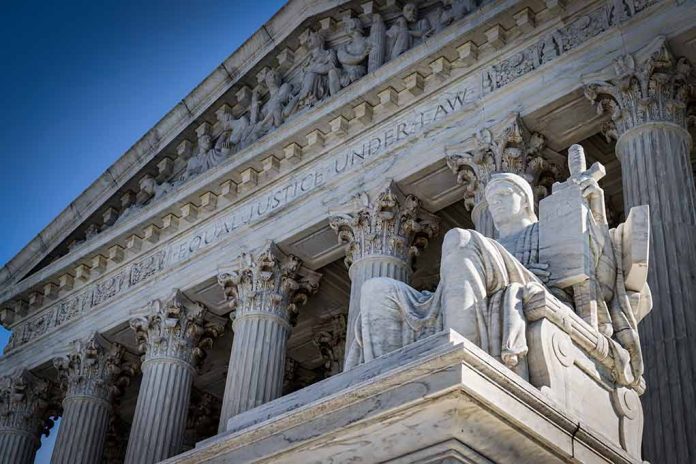
The Supreme Court rejected a challenge to California’s gun show ban on state property, dealing yet another blow to Second Amendment rights as constitutional conservatives question the Court’s commitment to defending fundamental freedoms.
Key Takeaways
- The Supreme Court declined to hear B&L Productions v. Gavin Newsom, effectively upholding California’s ban on gun shows on state property.
- The decision follows a concerning pattern of the judiciary showing reluctance to robustly defend Second Amendment rights.
- Justice Clarence Thomas previously emphasized strong Second Amendment protections in a 2022 ruling, making this refusal to hear the case particularly disappointing.
- The Court’s inaction allows California to restrict gun rights without meeting the high standard of justification that constitutional freedoms should demand.
- Critics point to Chief Justice Roberts and Justice Barrett as increasingly unreliable defenders of constitutional rights.
Court Declines to Defend Gun Rights
In a move that has alarmed Second Amendment advocates, the Supreme Court declined to review a case challenging California’s prohibition of gun shows on state property. The case, B&L Productions v. Gavin Newsom, had previously been upheld by the notoriously liberal 9th U.S. Circuit Court of Appeals. By refusing to hear the appeal, the Supreme Court has effectively allowed California’s restrictions to stand without requiring the state to justify its infringement on constitutionally protected rights. This decision comes despite the clear language of the Second Amendment stating that the right to keep and bear arms “shall not be infringed.”
Oh shocker. No Snope or Ocean State on the SCOTUS Orders LIst (again). But the B&L Productions case from California was denied. So,we play on. pic.twitter.com/qdvKKDtpVb
— WashingtonGunLaw (@GunWashington) April 28, 2025
Conservative Justices Under Scrutiny
The Court’s decision has raised serious questions about the commitment of some justices to protecting constitutional freedoms. Justice Clarence Thomas had previously established a strong defense of Second Amendment rights in a landmark 2022 case, making the Court’s current reluctance to hear this challenge particularly disappointing. Many Second Amendment supporters have expressed growing concern about Chief Justice John Roberts and Justice Amy Coney Barrett, both of whom were expected to be reliable defenders of constitutional rights but whose voting patterns have increasingly frustrated conservatives seeking robust protection of fundamental liberties.
“For months, high-ranking Government officials placed unrelenting pressure on Facebook to suppress Americans’ free speech. Because the Court unjustifiably refuses to address this serious threat to the First Amendment, I respectfully dissent,” remarked Justice Alito. While this quote from Justice Alito referred to a different case involving free speech, it reflects a similar concern about the Court’s unwillingness to confront government restrictions on constitutional rights. The parallel to the gun show case is striking, as both situations involve the Court declining to address what many see as clear government overreach into protected freedoms.
The Bill of Rights as a Constraint on Government
At the heart of this controversy is a fundamental disagreement about the nature of constitutional rights. The Bill of Rights was never intended to grant privileges from government to citizens, but rather to establish firm limitations on government power. When courts allow states like California to restrict Second Amendment rights without compelling justification, they invert this relationship, treating constitutionally protected freedoms as privileges that can be curtailed at the government’s discretion. This approach fundamentally misunderstands the purpose of constitutional protections.
Practical Implications for Law-Abiding Citizens
Critics of California’s gun show ban point out that such restrictions primarily affect law-abiding citizens while doing little to deter those with criminal intent. Gun shows represent a regulated marketplace where firearms enthusiasts, collectors, and those seeking self-protection can legally purchase firearms after completing the required background checks. By restricting these venues, California is limiting access to a legal activity without demonstrating how such limitations enhance public safety. The Supreme Court’s refusal to review the case means these restrictions will remain in place, potentially serving as a model for other states seeking to limit Second Amendment rights.
The Court’s decision not to hear this case continues a troubling pattern of judicial reluctance to hold governments accountable when they infringe on constitutional rights. For many Americans who value their Second Amendment freedoms, the hope now turns to future cases and the possibility that the Court will eventually recognize its responsibility to protect all constitutional rights with equal vigor.
Sources:
SCOTUS Betrays Again – This Time Sides with California Against Gun Owners
Supreme Court won’t hear challenge to California ban on gun shows on public land



